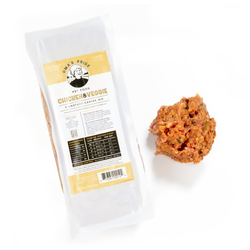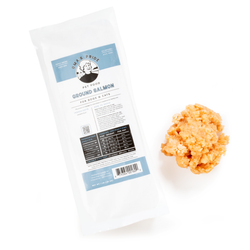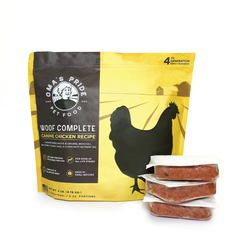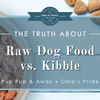Bone Broth for Dogs: The Best DIY Recipe & Benefits
There are few things more delicious or nourishing than something homemade…whether we’re cooking for ourselves or our dogs!
In recent years, drinking bone broth has become popular for humans and dogs alike. However, bone broth isn’t just trendy—people have been making it for thousands of years across the world for its positive health impacts.
When prepared correctly, bone broth can be a nutritious addition to your furry friend's diet, providing essential nutrients and improving their overall well-being.
Bone broth for dogs is beneficial because it aids the gut and digestion, boosts immunity, detoxes the liver, and strengthens joints. Common ingredients in bone broth include marrow bones, turmeric, select herbs, apple cider vinegar, and celery.
In this blog post, we’ll share a delicious and wholesome bone broth recipe for dogs featuring high-quality ingredients and special considerations to ensure your pup's health and happiness.
Table of contents
- What is bone broth?
- Benefits of bone broth for dogs
- Common ingredients in bone broth
- How to feed bone broth to your dog
- Tips for choosing a store-bought broth
- DIY bone broth recipe
- Frequently asked questions
What is bone broth?
Bone broth is a rich, nutritious, and hearty liquid made by simmering raw animal bones with herbs, vegetables, and other ingredients.
To properly make the broth, animal bones should be attached to ligaments, cartilage, marrow, and tendons. Common cuts include marrow bones, feet, or even necks. After a long, slow-heat process, essential minerals and nutrients are extracted from the bones, leaving a hearty, edible broth behind.
Both dogs and humans can eat bone broth; however, to make the broth dog-safe, some ingredients like salt and onions should be left out of the pot.
Bone broth versus bone stock
You may be wondering if there’s a difference between “stock” and “broth.”
While stocks and broths are cooked using the same ingredients, broth typically simmers longer than stock. In general, broth simmers for at least 12 hours up to 48 hours. Stock only simmers for a few hours.
Due to longer cooking times, broth is much richer, heartier, and more flavorful than stock. This rich flavor makes it attractive and nutritious for dogs and humans alike.
7 benefits of bone broth for dogs


1. Improves gut and digestive health
Collagen, glutamine, gelatin, and glycine are all properties found in bone broth that support the gut and digestion:
- Collagen and gelatin. Slow-cooking animal bones releases collagen and breaks it down into gelatin. Collagen and gelatin are mainly responsible for supporting connective tissues, bones, and ligaments. They soothe digestive inflammation and strengthen the gut lining.
- Glycine and glutamine. Bone broth is rich in two amino acids that support gut health: glycine and glutamine. Glycine protects intestinal mucus against stress and lowers stomach acid levels. Glutamine strengthens the stomach lining and connective tissues.
Unfortunately, many dogs live with a syndrome called “leaky gut.” Leaky gut occurs when a dog experiences life stressors, poor diet, trauma, or other health issues. When the gut barrier is weakened, it allows unwanted toxins and bacteria in.
The good news: Bone broth is excellent for dogs with leaky gut syndrome. The gelatin found in bone broth strengthens the gut barrier and reduces inflammation, allowing beneficial nutrients to be absorbed while keeping unwanted toxins out.
Overall, incorporating bone broth into your dog's diet allows them to experience the benefits of gut-strengthening proteins and amino acids. Bone broth can ease intestinal irritation, strengthen the gut lining, and reduce stomach acidity.
2. Enhances immunity
Many amino acids found in bone broth are critical for optimal immune function. Bone broth is rich in proline, an antiviral amino acid that “plays important roles in protein synthesis and structure, metabolism… and nutrition, as well as wound healing, antioxidative reactions, and immune responses” (source).
Also, glycine in bone broth “has a broad spectrum of anti-inflammatory, cytoprotective, and immunomodulatory properties” (source), which is why bone broth is excellent for immunity and the GI tract.
Bone broth can reduce the chance of severe illness by strengthening the immune system—it can also help your sick dog or puppy fight illness and recover sooner.
3. Strengthens and repairs joints, muscles, and bones


Bone broth contains amino acids, proteins, and glycosaminoglycans that are essential for strong bones and joints.
Glucosamine, chondroitin, and hyaluronic acid are glycosaminoglycans (carbohydrates also known as GAGs) in bone broth. These all boost collagen production in the body and support connective tissue repair and growth.
The protein content in bone broth from collagen is vital for maintaining your dog’s bone structures. Collagen is “the major constituent of bone mass. Results from rodent studies have demonstrated that collagen peptides significantly increase the organic substance of the bone” (source).
Additionally, as pets age, they can start to experience joint degeneration. Incorporating bone broth into your pet’s diet can help keep the cushioning between bones as strong as possible, helping dogs age gracefully.
Overall, the joint-supporting nutrients in bone broth can increase your dog’s mobility, lubricate the joints, and keep bones strong and flexible.
4. Filters bodily toxins
Most dogs, even the most well-behaved, eat something they shouldn’t on occasion. When this happens, we want to be sure that the liver can purify toxins from the body to avoid serious illness.
We also live in a world that is sadly filled with toxins, from the air we breathe to the water we drink. Dogs are exposed to these toxins on a daily basis and can benefit from added dietary nutrients to help them detox. This is where bone broth comes in!
One cup of bone broth contains about 0.5 to 1.7 grams of glycine, an amino acid.
Glycine performs many functions in the body, including detoxification. Glycine “improves survival rate and liver function by controlling the production of pro-inflammatory or anti-inflammatory cytokines in the endotoxin-induced liver injury mouse model” (source).
5. Boosts hydration and helps picky eaters
Keeping your dog hydrated in all circumstances is essential. Water is critical for just about every bodily function, from energy to body temperature to illness recovery.
In general, a raw dog food diet contains more moisture (intracellular moisture in the food) to keep your pet hydrated. However, if you feed a freeze-dried or kibble diet, adding moisture to the bowl with water or bone broth is essential.
Adding bone broth to your pet’s bowl makes the food appealing with a beefy taste they love; it also hydrates from the high water content.
Additionally, having bone broth on hand is a good idea in case your pup experiences an upset stomach, diarrhea, or vomiting. Bone broth reduces gut inflammation and hydrates your pup, making it a powerful tool to help your dog recover from illness.

6. Promotes skin and coat health
As dogs age, collagen production in the body begins to slow down. This has many negative impacts, including a less youthful appearance and shiny coat.
Collagen and glycosaminoglycans (GAGs) improve the skin’s moisture and elasticity, leading to shinier, healthier skin and coat.
Adding collagen-rich bone broth into your dog’s diet can help them improve collagen production, reduce bodily inflammation, and properly hydrate the body.
7. Provides sleep support
The amino acid glycine in bone broth elevates serotonin and is terrific for improving sleep quality.
In fact, “glycine ingestion before bedtime significantly ameliorated subjective sleep quality in individuals with insomniac tendencies…The decline in the core body temperature might be a mechanism underlying glycine's effect on sleep, as the onset of sleep is known to involve a decrease in the core body temperature.” (source)
Some dogs begin to experience nighttime anxiety, interrupted sleep, or even insomnia as they age. Incorporating foods rich in glycine, like bone broth, can help improve sleep quality for elderly pets.
Common ingredients in bone broth (plus benefits)
While every bone broth recipe for dogs is different, there are some common ingredients you may want to consider adding. Each ingredient has its own unique benefits:
- Raw marrow bones. Raw marrow bones are rich in essential minerals like calcium, phosphorus, and magnesium. They also contain vital collagen to improve joint health, skin health, and more. (You can also use raw animal bones like chicken necks, duck necks, chicken backs, or turkey necks.)
- Turmeric. Turmeric is a yellow spice known for its antioxidant and anti-inflammatory properties. The active ingredient in turmeric, curcumin, can aid in reducing joint pain, promoting a healthy coat, and supporting overall immunity.
- Garlic. When used in moderation, garlic can provide several health benefits for dogs. It contains allicin, a compound known for its antimicrobial, detoxifying, and immune-boosting properties. Contrary to popular belief, fresh garlic is healthy for most dogs (see: Can Dogs Eat Garlic?).
- Apple cider vinegar. Organic, unfiltered, and raw apple cider vinegar has many benefits for dogs. ACV can help regulate blood sugar, improve heart health, manage yeast infections (antimicrobial), and reduce inflammation. ACV also has probiotics, which are excellent for the gut and digestion.
- Celery. Celery contains fiber, vitamins C, K, and A, in addition to folate, manganese, and potassium. It’s great for digestion when eaten in moderation and can boost mobility.
- Carrots. Carrots are filled with antioxidants like vitamin C to reduce oxidative stress. Additionally, the beta-carotene in carrots converts into vitamin A in the body, strengthening the eyes, the skin and coat, and bones.
You can add herbs like basil, thyme, parsley, and cilantro to bone broth.
Basil is linked to digestive health and immunity. Parsley is loaded with minerals and vitamins like A, C, and K; it also has antifungal properties and can flush out harmful bacteria from the urinary tract.
In small quantities, thyme has antiseptic and antibacterial properties—it’s also full of manganese, potassium, iron, and vitamins. Cilantro contains calcium, vitamins K and C, and magnesium to support bones, eyes, and immunity.
Explore Products
How to feed bone broth to your dog
Bone broth can be served as a treat, mixed with your dog's regular meals, or used to rehydrate dry food.
When introducing any new food, we recommend starting gradually and monitoring your dog for adverse reactions. If your dog has a sensitive stomach, giving them too much bone broth at once initially can lead to GI issues.
Safety tip: Never feed your dog the cooked bones from your DIY bone broth. Strain the broth first before feeding. Cooked bones can splinter easily because they are brittle, causing injuries in the mouth or intestines.
Can dogs eat bone broth every day?
Yes, dogs can eat bone broth every day in meals or as a treat. Bone broth is supplemental and should not replace a well-rounded diet, as it does not provide every vitamin, mineral, or nutrient your dog needs.
How much bone broth can I give my dog?
As a general rule, give your dog 1 ounce of bone broth per 15 pounds of body weight. So, if you have a medium 45-pound dog, you can safely give them about 3 ounces of bone broth daily.
Storing homemade bone broth
If you make your own broth, you can store it in the refrigerator in an airtight container for up to a week. You can also store bone broth in the freezer for up to a year.
Consider portioning bone broth into ice cubes in the freezer to extend the life of your broth. Then, simply move the cubes to the refrigerator to dethaw and serve in batches.
Tips: choosing a store-bought bone broth
If you’re not interested in making your own bone broth, you can buy a dog-safe broth in the store. Here are some tips for choosing the best broth:
- Check the ingredients. Note that many broths made for human consumption are not safe for dogs, as they often contain high sodium levels and ingredients like onions (toxic to dogs). Opt for a bone broth designed for pets to be safe.
- Look for quality. High-quality broths are crafted from actual bones (like raw beef bones), not made from other fillers. The best products list “beef bones” or another type of bone as the first ingredient (besides water). Stay away from anything with added natural flavors, which tend to be synthetic.
Generally, you can buy broth as a liquid (in the freezer, refrigerator, or at room temperature) or as a dehydrated powder.
DIY bone broth recipe

Ingredients
- 2 pounds of raw beef marrow bones from Oma's Pride (See Note 1)
- 2 quarts of purified water (or enough to cover the bones entirely by 2-3 inches)
- 1 teaspoon of turmeric
- 1 stalk of celery
- 1 medium-sized carrot
- 2-3 tablespoons of apple cider vinegar or lemon juice (See Note 2)
- 1 clove of garlic (optional—always consult with your holistic veterinarian if you are concerned)
- Additional fresh herbs as desired: cilantro, basil, thyme, parsley, oregano, or sage
Note 1: You can use raw beef marrow bones or whole animal parts like duck necks, chicken necks, chicken backs, or turkey necks. You can also use raw chicken, pork, or turkey bones.
Note 2: An acidic ingredient is vital to pull nutritious minerals from bones.
Note 3: Remember to source the best quality ingredients for the best results. Follow proper cooking guidelines and consult with your holistic veterinarian to ensure the best results for your furry friend.
Stovetop recipe instructions
- Place the marrow bones in a large stovetop pot and cover them with filtered water.
- Add turmeric, celery, carrot, apple cider vinegar (or lemon), garlic (optional), and additional fresh herbs to the pot as desired. These ingredients will enhance the flavor and provide additional nutrients for your dog.
- First, bring the mixture to a boil and then reduce the heat to a gentle simmer.
- Next, allow the broth to simmer on low heat for 12-24 hours.
- After the broth has finished cooking, let it cool down to room temperature before refrigerating it overnight. This allows the flavors to meld and ensures easy removal of excess fat condensation from the surface.
- The next day, take the broth out of the refrigerator. Using a strainer, separate the solid ingredients from the broth, ensuring a smooth and clear liquid. Discard the solids (never feed cooked bones to dogs). Skim off the fat layer from the surface of the broth. This step helps reduce the fat content, making it more suitable for your dog's diet.
- Divide the bone broth into small, airtight containers and store in the refrigerator or freezer as desired.
Crockpot or slow cooker recipe instructions
- Place the marrow bones in your crockpot or slow cooker and cover them with filtered water.
- Add turmeric, celery, carrot, apple cider vinegar (or lemon), garlic (optional), and additional fresh herbs to the pot as desired. These ingredients will enhance the flavor and provide additional nutrients for your dog.
- First, cook the broth on high for 1-2 hours.
- Next, reduce the heat to low and cook the broth for an additional 12-24 hours (24 hours is ideal). You can even go all the way up to 48 hours if desired.
- After the broth has finished cooking, let it cool down to room temperature before refrigerating it overnight. This allows the flavors to meld and ensures easy removal of excess fat condensation from the surface.
- The next day, take the broth out of the refrigerator. Using a strainer, separate the solid ingredients from the broth, ensuring a smooth and clear liquid. Discard the solids (never feed cooked bones to dogs). Skim off the fat layer from the surface of the broth. This step helps reduce the fat content, making it more suitable for your dog's diet.
- Divide the bone broth into small, airtight containers and store in the refrigerator or freezer as desired.
Frequently asked questions
Can I give my dog bone broth from the grocery store?
No, most bone broths from the grocery store are made for human consumption, not dog consumption. Bone broths at the grocery store often contain toxic ingredients for dogs, like onions or high sodium levels. Opt for a dog-safe broth instead.
Is bone broth good for dogs or not?
Yes, bone broth is good for dogs because it supports the gut and digestion, provides hydration, strengthens joints, and enhances immune function. Add it to your dog’s bowl during mealtime, or serve it as a nutritious treat.
Comments
Oma's Pride
Dec 05, 2025 at 11:10am
Hi Lyn, thank you for your comment. Beef broth sounds like a great option if your puppy is allergic to chicken protein. In general, it’s a misconception that small doses of fresh garlic are toxic for healthy adult dogs. Please see this helpful blog about the topic from an expert source: https://www.dogsnaturallymagazine.com/garlic-for-dogs-poison-or-medicine/. On the other hand, dogs should not eat onions in any form or amount. They are much more dangerous and should be avoided.
Other things to consider:
1. Many holistic veterinarians use fresh garlic in controlled amounts for dogs for its antimicrobial, antiparasitic, and cardiovascular benefits.
2. Studies demonstrating toxicity typically rely on extreme doses, and traditional veterinarians rely on zero-risk recommendations. While garlic is part of the allium family, which includes foods like onions and leeks, it is far less potent per gram and has medicinal uses.
3. While most dogs can eat garlic, some dogs should not. We always recommend consulting your holistic veterinarian before feeding garlic to your pet. For example, it is not recommended for pregnant or nursing dogs, dogs under 6 months old, breeds such as Akita or Shiba Inu, or dogs on certain medications, including blood thinners, heart medications, insulin, antacids, high blood pressure medications, and more.
4. This blog is not medical advice. Always follow your holistic veterinarian’s advice first and remove garlic from this bone broth recipe if there are any concerns.
Rhonda Itomura
Dec 05, 2025 at 11:26am
Hello, I have 2 black labs, age 5. They are both experiencing joint issues with one of their rear legs. The vet is pushing medications and talking surgery, which is the last thing I want for them. Will bone broth help with their joint issues. Also, my late mother’s name is Oma :)
Lyn
Dec 05, 2025 at 10:57am
I have an 8 month old pup who is allergic to chicken protein so wanting to make him some beef bone broth. I am very surprised though to find most recipes have garlic. I have been told by vets over many years that garlic, onion etc is toxic to our furry friends. Also if i choose to add turmeric to the bone broth is he too young for that or if he’s not too young how much can i safely add? Thankyou
Oma's Pride
Aug 28, 2025 at 01:45pm
Hi Amie,
Great question! While you can strain the broth while it’s still hot, we recommend following the recipe steps to ensure optimal flavor and safe handling. However, if you want to strain sooner, you can let the broth cool first, strain out the solid ingredients, refrigerate overnight, and finally remove the excess fat the next day. Hope this helps!
Leave a comment
Your email address will not be published. Required fields are marked with *















Oma's Pride
Dec 05, 2025 at 11:28am
Hi Rhonda, thank you for your comment! That is so cool that your mother’s name was Oma…what a great connection.
In general, bone broth can help support joint health in dogs, but it’s not a cure-all by itself, especially for serious joint problems or osteoarthritis (which is unfortunately common in labs). Bone broth contains collagen, gelatin, glucosamine, and chondroitin to support healthy cartilage, ligaments, and joint fluid. Regularly feeding broth can ease mild stiffness and support mobility. So, while bone broth is worth adding as a supportive measure, it likely won’t fix joint issues on its own. Here are some other recommendations:
1. If your dogs are not already on a high-quality raw diet, consider starting them on one. Feeding biologically appropriate food is such a vital part of keeping our pets healthy. A dog or cat that eats nutrient-rich raw foods develops a strong immune system and a healthy gut, which helps fight illnesses and diseases more effectively. Check this resource out: Why Raw?
2. Try to find a high-quality joint supplement to add to your dogs’ bowls. You can check out ours here: Advanced Mobility.
3. More intensive options could include something like PRP (platelet-rich plasma) therapy, stem cell therapy for dogs, or even amniotic stem cell therapy for dogs.
4. As always, this blog or our advice is not medical advice. Always follow your holistic veterinarian’s advice first. We hope this helps!